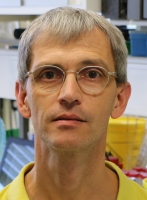
BioISI Research Seminars

Signaling pathways in glucose uptake and gene expression regulation
Peter Jordan (FCUL/INSA)
Glucose is a major source of energy for human cells and is taken up from the surrounding medium by plasma membrane glucose transporter proteins (GLUTs). Cancer cells frequently increase GLUT gene expression to fuel their high proliferation rate but the amount of GLUTs at the plasma membrane (PM) is also regulated by signaling mechanisms. We studied the role of protein kinase WNK1 in GLUT membrane traffic regulation and found in HEK293 cells that downregulation of WNK1 through RNAi caused a 2-fold decrease in PM GLUT1 expression and a 60% decrease in glucose uptake. WNK1 was shown in vitro to phosphorylate two homologous Rab-GAPs that determine whether GLUT1 storage vesicles can transit to the PM. Previously undescribed WNK1-phosphorylated residues were cloned as phosphomimetic or unphosphorylatable Rab-GAP mutants and their transfection into cells was sufficient to affect PM abundance of GLUT1.
To define in more detail the pathways regulated by WNK1, we determined the interactome of immunoprecipitated WNK1 by MS. Unexpectedly, two confirmed interacting proteins were related to mRNA processing and subsequent analysis identified a novel function of WNK1 in alternative splicing, using as a model the variant RAC1B in colorectal HT29 cells. In particular, WNK1 forms a complex with kinase GSK3β that controls the nuclear translocation of splicing factor SRSF1, which is important for inclusion of an alternative exon that gives rise to RAC1B. The role of WNK1 in regulating alternative splicing is independent from its activity in modulating PM abundance of GLUT1. Altogether, this work provided new details on the role of WNK1 in cell metabolism but also uncovered a new function in splicing, two events that can contribute to tumor development.


